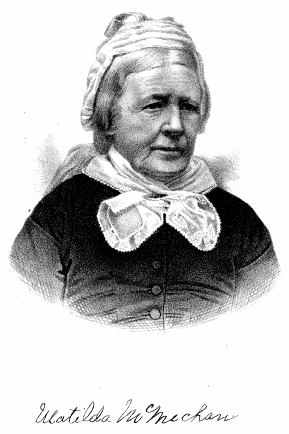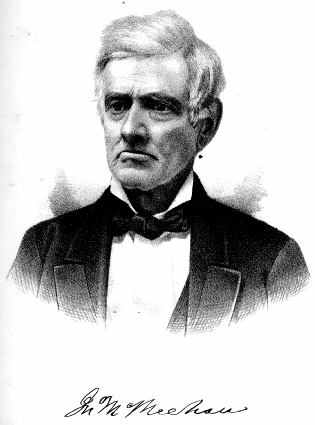B., Mary E., Lucy W., George E. and
Roberta L., are at home with their parents. Mr.
Austin, politically, is a sound Democrat, and in 1887
was appointed to his present office.

 OHN
H. McMECHAN is a practical, prosperous farmer and
stock-raiser of Four Mile Precinct, and he is managing
with marked success the old homestead that was once
the property of his father, the late John McMechan, a
well-known and widely respected pioneer of Otoe
County. Our subject was born in Zanesville, Ohio, Feb.
22, 1839, coming of good old stock his ancestors
representing an ancient Scotch family, one of whose
members, the great-grandfather of our subject, during
the Reformation settled near Belfast, Ireland, and
became one of the large landowners of the Kingdom.
Later, in the early years of this century, one of the
scions of that house, the grandfather of our subject,
a brave, high-spirited, energetic man, emigrated to
America and cast in his lot with the pioneers of
Ohio. OHN
H. McMECHAN is a practical, prosperous farmer and
stock-raiser of Four Mile Precinct, and he is managing
with marked success the old homestead that was once
the property of his father, the late John McMechan, a
well-known and widely respected pioneer of Otoe
County. Our subject was born in Zanesville, Ohio, Feb.
22, 1839, coming of good old stock his ancestors
representing an ancient Scotch family, one of whose
members, the great-grandfather of our subject, during
the Reformation settled near Belfast, Ireland, and
became one of the large landowners of the Kingdom.
Later, in the early years of this century, one of the
scions of that house, the grandfather of our subject,
a brave, high-spirited, energetic man, emigrated to
America and cast in his lot with the pioneers of
Ohio.
We are pleased to be able to give so
much interesting history of the life of John McMechan,
the father of our subject; John McMechan died Nov. 3,
1883, at "Headwood," the family residence in Otoe
County, near Nebraska City, of the infirmities
incident to old age, being eighty-three years and
twenty-three days old. The McMechan family is of
Scotch origin, and lived in Ayrshire, but being active
and leading members of the "Solemn League and
Covenant," was forced by religious persecution to
leave Scotland in 1650, and settled in County Antrim
in Ireland, near "White Abbey," five miles from the
city of Belfast. John McMechan, the father of the
subject of our sketch, was a wealthy land-owner, and
the family estate in Ayrshire and Antrim County
numbered several thousand acres of grazing and
tillable land. His wife was a Miss Mary Ballentine,
daughter of David Ballentine, of Ayrshire, and
grandniece of Lord John Ballentine, a cousin of Mary
Queen of Scots. John McMechan was born on the 10th of
October, 1800, at the family homestead, "Carmonia,"
near the "White Abbey," five miles from Belfast. He
had four brothers and five sisters. He survived all of
his brothers and two of his sisters. In 1810 the
family came to America and settled in Belmont County,
Ohio, eight miles from Wheeling, Va., and his father
in the same year purchased the "Indian Springs" farm,
so called from the springs at which the Indians camped
previous to attacking Wheeling. His parents being
Covenanters, were remarkably reverent in their
observances of the teachings of divine truth, and he
being early impressed with them grew up with an
abiding sense of duty and right, and a strong
hostility to false pretenses. He received a good and
thorough common-school education, the best to be had
in those days in that new and sparsely settled
country. He also learned the lessons of a high moral
culture and of industrial habits, constituting the
basis of integrity and fidelity to duty, which marked
his career. At the age of seventeen he engaged in
mercantile pursuits, for which he was by nature
admirably fitted.
When twenty-one years of age he
moved to Mt. Pleasant, Ohio, and engaged in
merchandising, where he remained until 1826, when he
went to Zanesville, in the same State, and on the 24th
of April, 1827, he married Miss Matilda Ballentine,
the second daughter of David Ballentine, of that
town.
This happy union was blessed with a
family of six sons and four daughters, of whom one son
and one daughter died in infancy. During his residence
in Zanesville he engaged in the flouring-mill and
mercantile business. In 1842 he removed from
Zanesville to Glasgow, Mo., where he continued
merchandising, and at this place he built and
conducted the first packing-house on the Missouri
River. In 1846 he removed with his family to St.
Louis, Mo., where he embarked in the wholesale grocery
business, under the firm name of J. S. Thompson &
Co., afterward Hammill & McMechan, Worthington
& McMechan, and later John McMechan, until the
summer of 1853, when he closed out his business in St.
Louis.
In September, 1853, he removed to
Council Bluffs, Iowa, then the principal outfitting
and starting point for Utah and California
emigrants,
|



